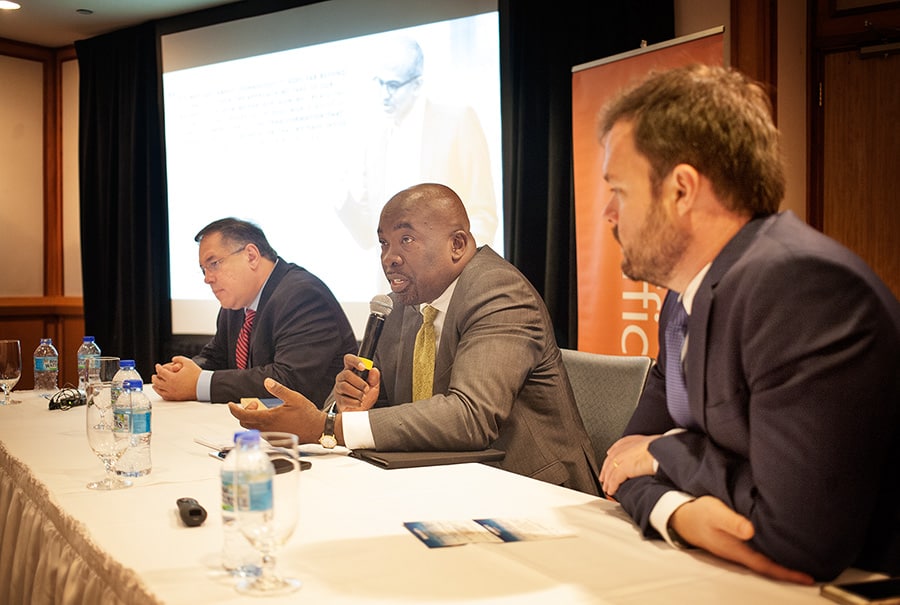
Above: The Public Sector panel on Digital Government at Microsoft’s M4, from left, Josemaria Valdepenas, Microsoft Digital Transformation Architect, Minister of Information Milford Nicholas and Marlon Fetzner. Photo by Mark Lyndersay.
BitDepth#1068 for November 22, 2016
Microsoft’s M4 is an inspiring sales pitch, one that’s focused on reorienting the thinking of its private and public sector clients about how the company is repositioning the products and services it offers to improve business and services.
A quote by the World Economic Forum’s Professor Klaus Schwab from his book The Fourth Industrial Revolution, turned up repeatedly in the talks as a sounding board for anyone hesistating about digital transformation.
“The First Industrial Revolution used steam power to mechanize production,” Schwab wrote.
“The Second used electric power to create mass production. The Third used electronics and information technology to automate production.”
“Now, a Fourth Industrial Revolution is building on the Third. It is characterized by a fusion of technologies that is blurring the lines between the physical, digital, and biological spheres.”
It’s one thing to talk that bold game in theory, and quite another to offer someone working in the space and doing so successfully in a business sector that’s traditionally been difficult for digitally enabled change to find traction in.
Milford Nicholas doesn’t look like a digital superhero. The Minister of Information, Broadcasting and Telecommunications for Antigua and Barbuda has a pugilist’s aspect, broad shoulders, a shaven head on a muscular neck and a keen, direct stare that commands attention.
But once he begins to talk, it’s clear that he’s as keen about tech as any weak-kneed geek with hornrims and a pocket protector and it’s probably not hurt his mission that he looks capable of decking anyone who gets in his way.
What he’s done in Antigua and Barbuda has been astonishing over the two years since he accepted Prime Minister Gaston Browne’s challenge to migrate the government from legacy paper-based systems to digitally enabled processes.
His ministry has completed 29 eGovernment projects for 2016 alone.
What he met after accepting his Ministerial contract was “an ICT infrastructure that was a hodgepodge of networks and systems with poor interconnectivity.”
“The use of data to inform policy was not well developed,” Nicholas said.
“We had inherited a British bureaucracy that prized moving paper from office to office.”
Crediting the previous administration with enacting legislation common to the OECS states that enabled decisive action on the problem, the Information Minister met with Microsoft, he thought, to sort out messy licensing issues in government.
He was quickly wooed to T&T for a “customer immersion experience” that introduced him to Microsoft’s Azure cloud platform and what it could offer to his government in its ambitious plans.
Milford Nicholas had already gotten a quote on implementing a Government wide-area-network and an integrated email platform so he had an idea of what it was going to cost to do the work piecemeal.
“I had to overcome my own apprehensions about cloud computing,” he admitted.
Aware that the electorate his party would meet at the polls would be predominantly millennials who wanted a very different relationship with their government, he pressed forward.
Within three months, Antigua and Barbuda had begun a Government-wide implementation of an Office 365 Enterprise level E3 platform and the automation of government services. Access to public information began a steady migration online.
From the first of January 2016, anyone in Antigua and Barbuda can renew their driver’s license and apply for a Visa online. Up next is the management of passports via an online application and the country’s Central Hospital and ports will also be overhauled and brought up to modern standards.
Antigua and Barbuda will use a hybrid system for data storage, keeping its most important data on servers on sovereign soil while leveraging the Azure cloud system for other datasets.
“The civil registry, treasury registry and electoral registry are managed locally on secured servers, but other information is cloud based in a hybrid system,” Nicholas said.
“The Public Sector must ensure that the same level of checks and balances that are part of real world operations are reflected in cloud based versions of the information.”
According to Microsoft’s Marlon Fetzner, Director Legal and Corporate Affairs, LATAM New Markets, in the company’s experience, roughly three percent of government information needs to be kept secure and even less of that is properly classified as national secrets.
That’s in line with the principles of open Government data, which supports the liberation of publicly captured data sets for review, inspection and analysis by the taxpayers who pay for its gathering.
To that end, Antigua and Barbuda has begun the digitizing of public records, not simply scanning paperwork, but moving the information frozen on paper into live datasets using a cross-ministerial team set up as a universal government service resource.
“It comes down to the art of the game,” Nicholas said.
“How you set your rules, how you manage your encryption, keeping government business on the government’s network.”
“The data I create is the property of the government and if I should be replaced, my successor will have the benefit of continuity and access to all the information I was responsible for creating and managing.”
“By the time of the end of my contract, Antigua and Barbuda should be a shining example of data driven governance.”

